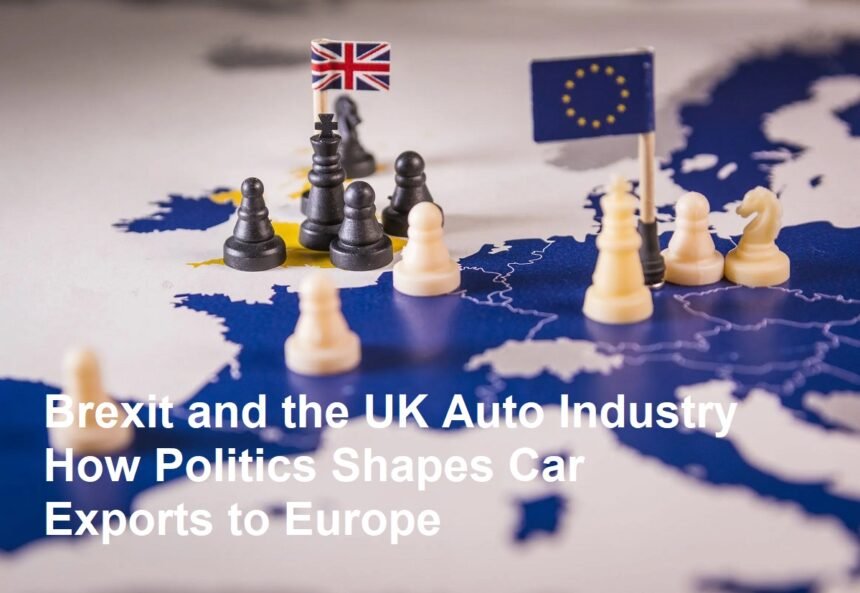Introduction: Cars, Politics, and the Brexit Effect
Brexit was never just about borders and bureaucracy—it was also about industries. Few sectors have felt the shockwaves as strongly as the UK’s automotive industry. Once a smooth exporter to the EU, the sector now faces new hurdles, from tariffs to regulatory headaches.
The big question is: what does Brexit and the UK auto industry really mean for car exports, trade deals, and the future of British manufacturing? Let’s break it down.
Brexit and the UK Auto Industry: A Closer Look
The Importance of Cars to the UK Economy
The automotive industry is one of the UK’s biggest manufacturing sectors, contributing billions to the economy and supporting hundreds of thousands of jobs. About 80% of cars made in the UK are exported, and nearly half of those go to EU countries.
Why Brexit Changed Everything
Before Brexit, UK-made cars flowed freely across the EU without tariffs or customs checks. But with the UK outside the EU single market, every export is now subject to stricter rules, paperwork, and potential tariffs.
UK Car Exports After Brexit
Numbers That Matter
The export of UK cars to the EU has slowed, partly due to uncertainty and new red tape. While luxury brands like Jaguar Land Rover still sell well, smaller manufacturers and suppliers struggle with the added costs.
Trade Barriers in Action
- Customs delays: Slower delivery times for parts and finished vehicles.
- Higher costs: New compliance requirements increase production expenses.
- Market uncertainty: EU buyers sometimes prefer to source from within the bloc for stability.
Post-Brexit Trade Tariffs and Their Impact
The Rules of Origin Challenge
One of the biggest headaches is the post-Brexit trade tariff system. Under EU-UK agreements, cars must meet “rules of origin” requirements to avoid tariffs. That means a certain percentage of parts must be sourced locally.
Problem? Many EV batteries come from Asia, making it harder for UK-made EVs to qualify for tariff-free exports.
What This Means for Automakers
- EV exports risk facing tariffs of up to 10%.
- Automakers may move production into the EU to avoid penalties.
- UK suppliers lose out if they can’t adapt supply chains quickly enough.
European Automotive Politics and the UK
Politics in the Driver’s Seat
European automotive politics play a huge role here. EU policymakers want to strengthen domestic manufacturing, especially in EVs and batteries. Brexit gave them more reason to prioritize EU-based production over imports from the UK.
Lobbying and Influence
- German and French automakers lobby for stricter standards that indirectly disadvantage UK exporters.
- The UK government, meanwhile, tries to negotiate exemptions and incentives to keep investment at home.
Opportunities Hidden in the Challenges
Pivot to Global Markets
While EU exports are tough, the UK is pursuing new trade deals with countries like Japan, South Korea, and Australia. This opens new markets for British cars, though it won’t fully replace EU demand.
EV Leadership Potential
The UK is investing heavily in EV technology, gigafactories, and greener mobility. If successful, this could make the country a leader in next-gen cars, giving it a competitive edge even outside the EU.
Practical Tips for Stakeholders
For Car Buyers
- Check pricing trends: Post-Brexit tariffs may make certain UK-made cars more expensive in the EU.
- Look for incentives: EV subsidies across Europe may still make British-made EVs affordable.
- Plan for delays: Shipping and customs issues could mean longer waiting times for new vehicles.
For Investors
- Monitor trade policy updates: A single EU-UK tariff change could reshape profits for automakers.
- Watch battery supply chains: Companies investing in local EV battery plants may gain a big advantage.
- Diversify geographically: Don’t rely solely on EU sales—follow where UK automakers expand globally.
For Businesses & Policymakers
- Adapt supply chains: Partner with local EU suppliers to meet rules-of-origin standards.
- Invest in EV capacity: The future of UK automotive competitiveness depends on electric mobility.
- Push for trade flexibility: Continued negotiation between the UK and EU is essential for avoiding crippling tariffs.
Common Questions About Brexit and UK Automotives
Will UK Cars Still Be Sold in Europe?
Yes—but with more hurdles. Cars that don’t meet rules-of-origin standards may face tariffs, making them less competitive.
Is the UK Auto Industry in Decline?
Not necessarily. While exports to the EU face challenges, global demand and the EV transition offer new growth paths.
Could Politics Reverse Some Challenges?
Possibly. If the UK and EU reach new agreements, some barriers could be softened. But much depends on ongoing negotiations.
Conclusion: Politics Still in the Driver’s Seat
The story of Brexit and the UK auto industry is one of politics reshaping trade. From UK car exports to post-Brexit tariffs and the larger game of European automotive politics, it’s clear that the rules of the road have changed.
For automakers, buyers, and investors, success will depend on adaptation—whether that means diversifying markets, embracing EVs, or finding smarter supply chain solutions. Brexit may have closed some doors, but it also opened new routes forward.
What’s your view—has Brexit hurt the UK auto industry beyond repair, or will it adapt and thrive in the EV era?
Drop your thoughts in the comments and let’s discuss. And don’t forget to share this article with friends and colleagues who follow the future of European cars.












